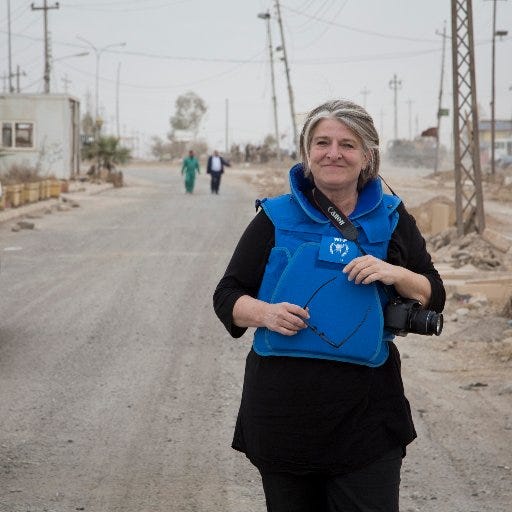 |
| Ingermarie Vennize |
Mary Salisu is heading a small group of women, one of many newly established mothers’ groups, in the south of Borno State in Nigeria’s northeast. Here, the United Nations World Food Programme (WFP), the United Nations Children’s Fund (UNICEF) and Action Against Hunger are running an Integrated Nutrition Program (INP) giving families access to health clinics, clean water, and hygiene and nutrition training.
In the Fall of 2018, WFP added another component to the INP educating and coaching women on how to do a start-up, how to establish little businesses as petty traders, pottery makers, tailors, millers or whatever is possible. They will get a little cash to get them started.
“Before I joined this group, I didn’t even know that I could be self-reliant, I did not know the concept. Only my husband had an income, but it was rarely enough for us to live on. Now all 15 of us in the group are making money,” says Mary Salisu.
“It makes me very happy and proud,”adds women’s leader who has started buying large jerry-cans of cooking oil and selling it in smaller quantities for a most welcome profit.
It’s about opportunities
Although women farmers in Nigeria do up to 70 percent of the manual labor, only 16 percent actually own land. And of the ten million children not in school, six out of ten are girls in a country where 23 million girls and women were married before the ages of 18.Women will often be employed in typical women’s job with much smaller pay checks than a man would get, they will be under-employment, or have no job at all. But given an opportunity to make an income, women buy good food — keeping everybody healthy, and happily pay to send their own girls to school.
SainapAdama is also part of the group. She buys cheap millet from the local farmers, and sells it on a nearby Wednesday market when she has a full sack:“I am making about 1000 Naira a week. I feel so happy as I never had that kind of money before. And my husband is grateful, too.”
Gender inequalities are deep-rooted in every society, but research shows that investing in women and girls positively impacts not only their lives, but also the economy of an entire country. This is why a food security agency like WFP is applying a gender lens to all of its activities.
“Globally, women are underrepresented in the political and economic decision-making processes — leaving it up to mostly men to implement the structural changes,” says Myrta Kaulard, the Representative and Country Director of WFP in Nigeria.
“Millions of women suffer from female genital mutilation, get married off as girls and are abused in so many ways. They are often the most vulnerable in a community yet left with the main responsibility of their families. We need to empower women at all levels, step by step, to be able to fight for themselves.”
In the conflict affected northeast of Nigeria, every month, WFP is providing cash and food assistance to around 700,000 people, who have no other ways of supporting themselves. Knowing that poor maternal nutrition and limited access to diverse nutritious food are key underlying causes of child undernutrition, WFP is targeting women in the emergency response.
As a supplement to the general food distributions, WFP is therefore providing preventive nutrition assistance to all women, who are either pregnant or breastfeeding — 115,000 total — to keep them healthy, strong and able to care for their families. In Nigeria over 43 percent of children under the age of five are underweight, and even more so in the northeast.
Looking ahead, WFP’s Country Strategic Plan for Nigeria for the next four years, will have a strong focus on resilience building, and WFP will expand its income generating activities and livelihood programs significantly. These will have a strong focus on women as experience shows they not only need it, but they are also very good with money.
If given the chance, women will spend profits to improve the living standards for all family members, and if using microfinancing, for instance, as a way to start businesses, research shows that they pay loans back faster than men.
KaidarBukar is enrolled in a livelihood program called FADAMA, run in four villages on the outskirts of Maiduguri in Borno State. Displaced to Kiribiri village, FADAMA gave her the opportunity to learn tailoring skills.Kaidar is part of a group of 10, and 40 percent of their profits are pooled. Every 10 weeks a member will get the pooled funding for investing in new ideas and projects.
“We used to rely on begging and food assistance, but now I am hopeful to support my children myself, and even to put them through school,” says KaidarBukar. “I also want to start farming again by investing some of the money I earn.”










No comments:
Post a Comment